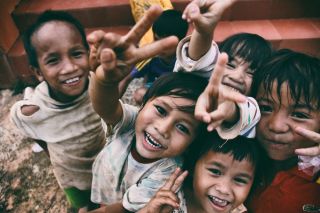Parenting
Growing Up in a Troubled World
Why today's kids need their parents more than ever.
Posted March 4, 2023 Reviewed by Vanessa Lancaster

Growing today can be daunting. While some children seem to be naturally resilient, many need the support and guidance of parents more than ever.
Parents play a crucial role in shaping their children's development, well-being, and outlook on life. They are a child's first teachers, caregivers, and role models. They provide the love, care, and stability children need to thrive. Parents can help their children navigate their challenges and uncertainties in a troubled world by providing a safe and secure environment, emotional support, and guidance.
Adults Behaving Badly
Children today seem to experience more mental distress than in previous generations.
Despite the widely respected–but sometimes contested–arguments by Steven Pinker and others about humanity becoming less violent over time, today's world remains hostile and inhospitable for many children. Many are growing up around racism, corruption, violence, war, economic disparity, injustice, and crime. They imitate, idealize, and learn from both good and badly-behaved adults. Children need their parents to show them that humans can and should be trusted. They must also learn first-hand that people should treat one another with dignity and respect. No matter what is happening in the outside world, parents can create a safe space for their children inside the family home.
One of the negative repercussions of COVID-19 lockdowns, in South Africa and many other places, was an escalation in domestic violence–likely linked to economic stress and disrupted employment. For children, the home should be a place of safety and a refuge from the conflict and chaos of the outside world, but those who live with hot-tempered, emotionally unstable adults can feel highly anxious and insecure. They often choose the violent and more powerful parent as their role model in an attempt not to be at the mercy of the perpetrator in their home. This defensive strategy is sometimes referred to as "identification with the aggressor." The child takes the position of the bully rather than the disempowered victim. This pattern can continue well into adult life, sometimes with serious consequences such as criminality.
Children trust and imitate what they have always known and what is familiar. They often remain intensely loyal to parents, even when they are abused, betrayed, and hurt by them. It is difficult for children to see the truth about their parents, even when that truth is unsavor, illegal, or cruel. But that leaves children in a difficult position psychologically, as facing the truth about a parent's failure might be too hard to bear. Children often look for excuses to protect their parents and preserve their goodness and integrity as much as they can–until they can't any longer.
One of the challenges of being a parent is to hold yourself to a higher standard than that by which you are surrounded. Even when you behave badly, your children will idealize you. For some, that lasts forever, but for others, it lasts only until children are old enough to know better. Your child’s behavior often mirrors your moral compass.
Why Parenting Matters
Parents influence their children more than most people they will ever encounter. Children inherit genes from their parents and learn how to function in the world based on who their parents are and how they think, feel, and behave. Parents’ behaviors and attitudes are seen as acceptable to the child, even when, objectively, they are unacceptable.
Some psychological disturbances and psychiatric disorders have been linked to problems with early parenting. Some researchers have found that poor parenting is a key risk factor in developing early psychopathology. Low levels of sensitive parenting and greater use of harsh discipline have been linked to the development of behavioral problems. Initiatives that aim to improve parenting early on, when the child's brain and biological systems that underlie mental health rapidly take shape, appear to have a better outcome.
Children need to feel safe and protected at home, so they can focus on learning, growing, and exploring the world around them. Parents need to be vigilant about the risks and dangers that their children might face, such as exposure to violence, abuse, or exploitation. They need to protect their children by monitoring their online activities, teaching them about safety rules, and creating a supportive network of family and friends.
Parents also need to provide emotional support to their children. Children can feel overwhelmed by their challenges. They might feel anxious, sad, angry, or confused about what is happening in the world around them. Parents can help their children by listening to their concerns, validating their feelings, and providing reassurance and comfort. They can also teach their children coping skills, such as mindfulness, relaxation techniques, or problem-solving strategies, to help them manage emotions and stress.
In addition to emotional support, parents can guide their children. Children need role models and mentors to help them develop positive values, beliefs, and behaviors. In a troubled world, parents can help their children understand issues such as social injustice, discrimination, or climate change, and teach them how to make a positive difference. They can also help children develop critical thinking skills, empathy, and compassion, so they can navigate complex issues and make informed decisions.
While parents play a critical role in supporting their children's development, well-being, and resilience, they can also feel overwhelmed, stressed, and anxious about challenges like economic insecurity, political unrest, or health crises. They might also face social isolation, discrimination, or stigma, any of which can affect their mental health and well-being. In such situations, parents need to take care of themselves so that they can take care of their children. They must seek support from family, friends, or mental health professionals and practice self-care strategies, such as exercise, relaxation, or hobbies.
What You Can Do
- Think about the atmosphere you want to create within your child's home.
- Keep your home a violence-free zone.
- Aim toward being more sensitive to your child's feelings.
- Try not to hit or hurt your children, even in an attempt to teach them how to behave.
- Discuss child-rearing concerns with a psychotherapist and get support when you feel you are not coping with the stress of being a parent.
- Keep your children physically and mentally safe as much as you possibly can. If you struggle with that, doctors, psychotherapists, social workers, educators, faith-based organizations, and welfare agencies can support your parenting journey. Use the available support to help raise your children to be the best they can.
To find a therapist, visit the Psychology Today Therapy Directory.
References
Pinker, Steven. The Better Angels of Our Nature. New York: Viking, 2011.
Ryan, Rachael, Christine O’Farrelly and Paul Ramchandani. ‘Parenting and Child Mental Health’. London Journal of Primary Care 9, no. 6 (2017): 86–94. https://doi.org/10.1080/17571472.2017.1361630.
Howell, Elizabeth F. ‘Ferenczi’s Concept of Identification with the Aggressor: Understanding Dissociative Structure with Interacting Victim and Abuser Self-States’. American Journal of Psychoanalysis 74 (March 2014): 48–59. https://doi.org/10.1057/ajp.2013.40.




